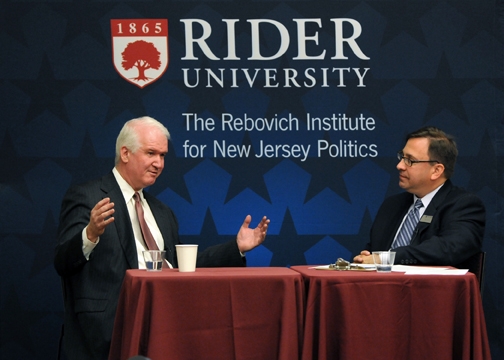Wednesday, Apr 21, 2010
Recently retired after a generation in New Jersey politics, former Assembly Speaker Joseph J. Roberts Jr. can still recall the formative experiences that helped shape his career in Trenton. “Life lessons affect what we learn,” Roberts told a capacity audience inside the Mercer Room of Daly Dining Hall on Rider’s Lawrenceville campus, on April 14. He explained how, as a youngster of 9 or 10, he would accompany his father, a municipal official in their South Jersey town of Bellmawr, while the elder Roberts issued licenses to local restaurants.
“The owner of an ice-cream shop offered my brother and I free ice cream cones, but my dad said it would be wrong for an official of the town to accept that,” Roberts recalled, beginning to grin. “I learned later about ‘pay-to-play.’”
Roberts was a guest of the Rebovich Institute for New Jersey Politics at Rider University, as part of the Rebovich Institute’s Governing New Jersey series. The appearance was highlighted by a frank and informative Q&A session with Ben Dworkin, director of the Rebovich Institute. The event marked Roberts’ first major public talk since leaving office in January.
A Democrat who represented the 5th Legislative District, Roberts served in the New Jersey State Assembly from 1987 until his 2010 retirement, spending his last four years as Speaker of the Assembly. Roberts was replaced as speaker by Sheila Oliver of the 34th District.
Roberts said that the role of a legislative leader changed somewhat over this time in office, making note of the increased scrutiny that today’s lawmakers now find themselves under. “That’s good and that’s bad,” said Roberts, who has also noticed an increased shrillness in political discourse. “There is so much polarization in Washington, and we have it here in New Jersey, too.”
He was then asked by Dworkin to name something of which he was particularly proud from his tenure in Trenton. “I tried to bring more civility to the legislative process, and to do something for property taxes,” he answered, before conceding, “I don’t like to think I was 0-for-2.”
Political effectiveness involves much more than simple mastery of policy, according to Roberts, who has been a member of the Democratic National Committee since 2001 and chaired the New Jersey Democratic State Committee in 2001 and 2002. “I always made it a point to take committee members from the other party out to dinner,” he explained. “Those are the kinds of things that help keep emotions under control in Trenton. It’s much tougher to verbally punch someone in the nose if you know them personally. The legislature is very relationship-driven. If you like someone, you’ll be more likely to help them and work with them.”
Regarding his term as Assembly speaker, Roberts said he was proud to have spent much time and effort on the fight to regionalize governmental and educational services for New Jersey, which currently has more than 600 municipal governments and more than 550 school districts. “I think it’s pretty clear that strong regional services are a more effective model,” he said, pointing to the efficiency of the strong Camden County Democratic Organization. “There, we’ve taken government and made it businesslike, rather than running it like a business. It’s appealing to citizens and taxpayers who want to get value from their officials.”
Roberts also said he was frustrated by his party’s inability to advance marriage equality in New Jersey prior to his leaving office in January 2010. “It’s really unfortunate that we were not able to achieve this,” he lamented.
When Dworkin asked Roberts about his decision to retire from the Assembly in the midst of the hotly contested 2009 gubernatorial race, Roberts admitted that he had little choice but to make his decision public when he did, even if the news came at an inopportune time for his Democratic allies.
“The leadership fight (to replace Roberts as speaker) spilled into the Senate and proved to be a distraction when the party needed to be unified,” said Roberts, who had actually filed to run in the 2009 primary election last spring. “Once the budget was completed, I made my plans to retire known by the summer. I would’ve had to run and be on the ballot in November for an office I never intended to hold.”
Since his decision not to seek reelection, Roberts has been appointed to the Board of Governors at Rutgers University. “That keeps me involved,” he said, adding that it’s his friends in government that he misses to most about his retirement. “You don’t spend two decades in Trenton without forming relationships.”
Looking ahead, Roberts urges his former Democratic colleagues to work with Gov. Chris Christie in his fight to solve the state’s fiscal ills. “I learned over the years that Democrats don’t have all the answers, and neither do Republicans,” he said. “Now, the Democrats have to resist the temptation to do what the Republicans have done in Washington and become the party of ‘no.’ But the rhetoric on both sides is a little overheated right now.”

